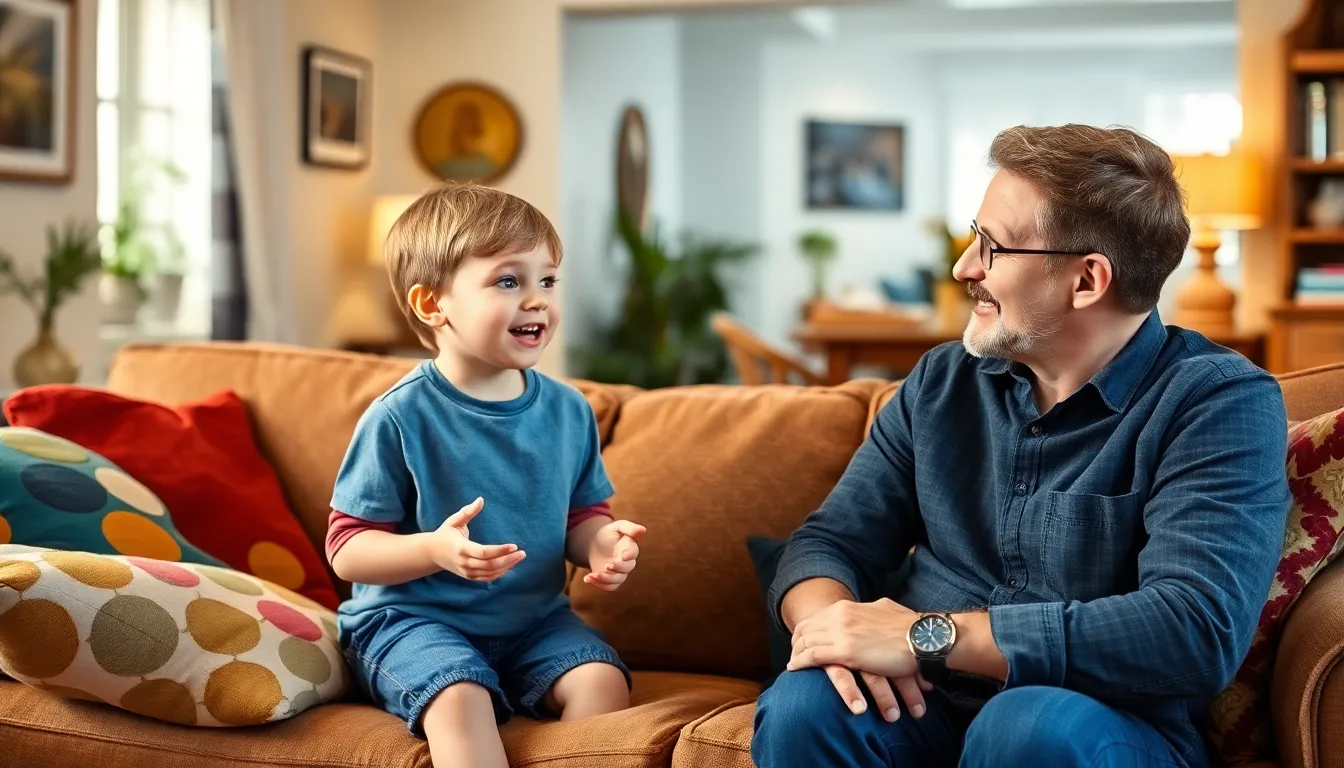In a world where technology often dominates interactions, kids remind us of the power of open communication. Their natural curiosity and candidness create an environment where thoughts and feelings flow freely. By fostering these conversations, children not only express themselves but also encourage adults to engage more openly, bridging generational gaps and strengthening relationships.
Encouraging open communication in kids nurtures their emotional intelligence and social skills. It helps them articulate their needs and feelings, making them more confident individuals. As they learn to communicate effectively, they influence their peers and families, promoting a culture of honesty and understanding that benefits everyone involved.
Table of Contents
ToggleImportance Of Open Communication
Open communication plays a crucial role in children’s development and family dynamics. It fosters a safe environment for expressing thoughts and feelings, which benefits both kids and parents.
Benefits For Kids
- Emotional Awareness: Open communication helps kids identify and articulate their emotions, leading to better emotional regulation.
- Increased Confidence: Expressing thoughts freely boosts children’s confidence, enabling them to speak up in group settings and assert themselves.
- Enhanced Social Skills: Continuous dialogue hones social skills, such as empathy and active listening, vital for strong peer relationships.
- Problem-Solving Abilities: Open discussions encourage kids to think critically, enhancing their problem-solving skills when facing challenges.
- Resilience Building: Communication teaches kids to cope with adversity, promoting resilience through shared experiences and support.
Benefits For Parents
- Stronger Relationships: Open lines of communication lead to deeper connections with children, fostering trust and understanding.
- Easier Conflict Resolution: Parents can address issues more effectively when children feel comfortable discussing their concerns.
- Better Insight into Kids’ Lives: Parents gain valuable insights into their children’s experiences and emotional states, helping tailor guidance and support.
- Encouragement of Open Dialogue: Establishing a communicative environment with children encourages parents to share their thoughts openly, enhancing mutual understanding.
- Promotes Family Cohesion: Strong communication bonds the family together, creating a supportive atmosphere where all members feel valued and heard.
Strategies To Foster Open Communication

Fostering open communication requires intentional strategies that promote a safe space for dialogue. Implementing these approaches can significantly enhance the interactions between children and adults.
Creating A Safe Environment
Creating a safe environment is essential for open communication. Parents and caregivers can create this environment by:
- Encouraging Expression: Allowing children to express their thoughts and feelings without fear of judgment.
- Validating Emotions: Acknowledging children’s emotions to help them feel understood and valued.
- Being Approachable: Maintaining a demeanor that invites children to share without hesitation.
- Establishing Trust: Honoring confidentiality helps children feel secure in their conversations.
By prioritizing these elements, adults contribute to a culture where children feel free to express themselves.
Encouraging Active Listening
Encouraging active listening enhances communication quality. Adults can facilitate this practice through:
- Maintaining Eye Contact: Demonstrating attentiveness by looking at the child while they speak.
- Using Reflective Responses: Summarizing or paraphrasing what the child says to show understanding.
- Minimizing Distractions: Reducing background noise and maintaining focus during discussions.
- Asking Open-Ended Questions: Promoting deeper conversations by asking questions that require more than yes or no answers.
These techniques foster genuine engagement, allowing children to articulate their thoughts and concerns effectively.
Activities To Promote Dialogue
Engaging in specific activities promotes open communication between children and adults. These interactions foster deeper connections and enhance the overall family dynamic.
Family Meetings
Family meetings encourage structured dialogue within the household. Regularly scheduled gatherings, held weekly or biweekly, provide a platform for all members to voice thoughts and share updates. Key elements of effective family meetings include:
- Setting a consistent schedule: Weekly or biweekly slots help establish routine.
- Creating an agenda: Outlining topics for discussion keeps conversations focused.
- Encouraging participation: Allowing each member, including kids, to contribute ensures diverse viewpoints.
- Promoting problem-solving: Addressing family issues collaboratively cultivates teamwork and connection.
These gatherings create an inclusive atmosphere where children feel valued and empowered to express themselves.
Storytelling Sessions
Storytelling sessions nurture creativity and open lines of communication. Engaging children in stories fosters imagination and can lead to insightful discussions. Essential tips for effective storytelling sessions include:
- Incorporating diverse stories: Choose tales from various cultures and perspectives to broaden understanding.
- Encouraging questions: Prompt children to ask questions about the story, facilitating dialogue.
- Inviting personal connections: Encourage kids to relate stories to their own experiences, deepening engagement.
- Facilitating role-play: Allow children to reenact scenes, promoting expression and empathy.
These interactive sessions help children articulate their feelings and perspectives while enhancing their storytelling and listening skills.
Challenges In Maintaining Open Communication
Open communication faces challenges that can hinder the development of healthy dialogues between children and adults. Identifying and addressing these obstacles enhances understanding and connection.
Overcoming Barriers
Barriers such as fear of judgment, lack of time, and generational differences can obstruct open dialogue.
- Fear of Judgment: Children might hesitate to express thoughts if they fear criticism. It’s essential to create a non-judgmental space where all ideas are accepted.
- Lack of Time: Busy schedules often limit quality interactions. Prioritizing dedicated family time helps establish consistent communication.
- Generational Differences: Varied communication styles may lead to misunderstandings. Active listening and patience foster better exchanges and bridge this gap.
Addressing these barriers cultivates a welcoming environment for expression.
Navigating Difficult Topics
Certain subjects, such as emotions, relationships, or challenging experiences, can prove difficult to discuss.
- Emotional Topics: Kids may struggle to articulate feelings. Encouraging them to share regularly normalizes discussions about emotions.
- Relationships and Peer Pressure: Children face social pressures that may weigh heavily. Open discussions about these topics build trust and help children navigate challenges.
- Challenging Experiences: Kids encountering difficulties may feel isolated. Supporting them in sharing experiences fosters resilience and emotional growth.
Navigating these topics requires sensitivity and understanding, reinforcing communication pathways.
Open communication is vital for children’s growth and development. It not only enhances their emotional intelligence and social skills but also strengthens family bonds. By fostering an environment where kids feel safe to express themselves, families can build trust and understanding that lasts a lifetime.
Encouraging dialogue helps children develop confidence and resilience while enabling parents to gain deeper insights into their lives. The strategies and activities discussed provide practical ways to nurture these essential conversations.
When families prioritize open communication, they create a culture of honesty that benefits everyone involved. This commitment to dialogue not only enriches relationships but also equips children with the skills they need to navigate the world effectively.





